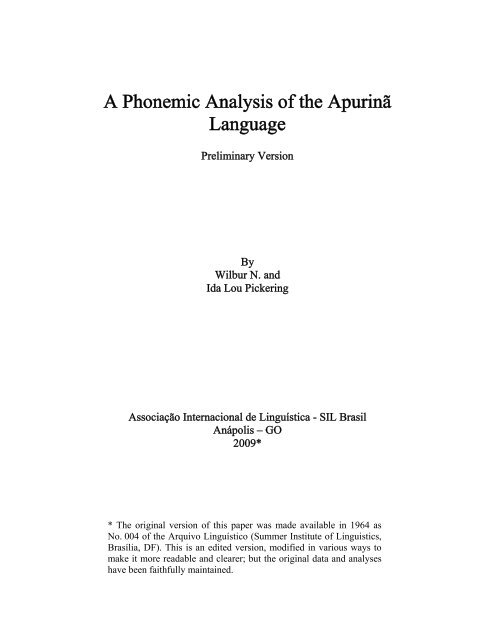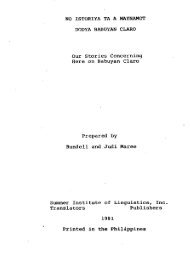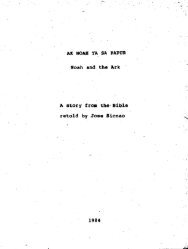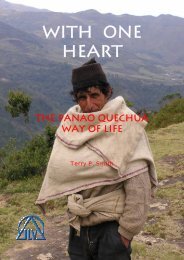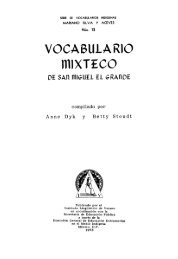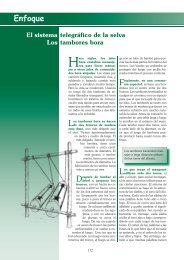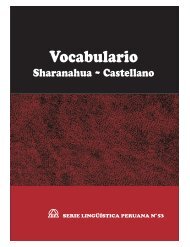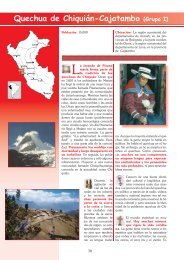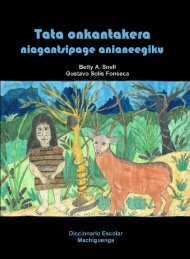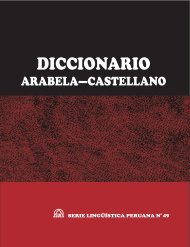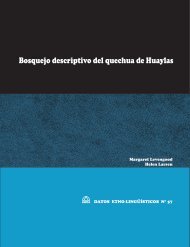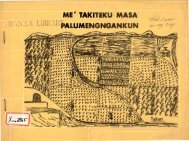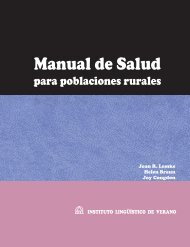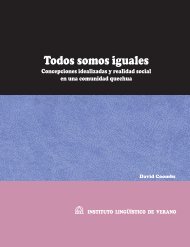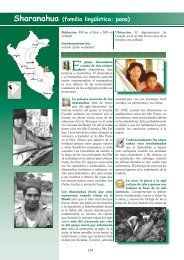A Phonemic Analysis of the Apurinã Language
A Phonemic Analysis of the Apurinã Language
A Phonemic Analysis of the Apurinã Language
Create successful ePaper yourself
Turn your PDF publications into a flip-book with our unique Google optimized e-Paper software.
A <strong>Phonemic</strong> <strong>Analysis</strong> <strong>of</strong> <strong>the</strong> Apurinã<strong>Language</strong>Preliminary VersionByWilbur N. andIda Lou PickeringAssociação Internacional de Linguística - SIL BrasilAnápolis – GO2009** The original version <strong>of</strong> this paper was made available in 1964 asNo. 004 <strong>of</strong> <strong>the</strong> Arquivo Linguístico (Summer Institute <strong>of</strong> Linguistics,Brasília, DF). This is an edited version, modified in various ways tomake it more readable and clearer; but <strong>the</strong> original data and analyseshave been faithfully maintained.
CONTENTSI. Introduction 2II. Chart <strong>of</strong> Phones 3III. Interpretation Procedures 4IV. Contrastive Chart <strong>of</strong> Phonemes 13V. Evidence for <strong>Phonemic</strong> Decisions 14VI. Formational Statement <strong>of</strong> Phonemes 30VII. Hyperphonemic Observations 34VIII. Distribution <strong>of</strong> Phonemes 35I. IntroductionThe Apurinã tribe is found along <strong>the</strong> Purus River in <strong>the</strong> state <strong>of</strong> Amazonas. The termApurinã probably did not originate with <strong>the</strong> people <strong>of</strong> this tribe, but <strong>the</strong>y now freely recognize<strong>the</strong> term as referring to <strong>the</strong>m and it is by this term that <strong>the</strong> Neo-Brazilians <strong>of</strong> <strong>the</strong> area designate<strong>the</strong> tribe. The tribe is fast disintegrating. Little groups or even individual families may be foundscattered along <strong>the</strong> length <strong>of</strong> <strong>the</strong> Purus from <strong>the</strong> Jari to <strong>the</strong> Acre (both are tributaries). Thenumber <strong>of</strong> living speakers has not yet been determined. The Apurinã remnant probably numbersover a thousand. Perhaps as many as half <strong>of</strong> <strong>the</strong>m still use and prefer Apurinã to Portuguese butthis guess may be too optimistic.This analysis is based exclusively upon <strong>the</strong> dialect spoken by a group <strong>of</strong> about 50Apurinã that live on <strong>the</strong> Igarapé São João about a mile downstream from <strong>the</strong> town <strong>of</strong> Tapauá at<strong>the</strong> mouth <strong>of</strong> <strong>the</strong> Ipixuna River. The number, extent and nature <strong>of</strong> o<strong>the</strong>r dialects has not yet beendetermined. The Apurinã language may be safely classed as Aruak. The material upon which thisanalysis is based was ga<strong>the</strong>red during a total <strong>of</strong> six months spent among <strong>the</strong> Apurinã. This timewas accumulated during three tribal visits: April 1963; July-September 1963; March-June 1964.The men can speak Portuguese well enough to buy and sell and talk about <strong>the</strong> wea<strong>the</strong>r, but <strong>the</strong>ydo not feel at home with <strong>the</strong> national language. The women control considerably less <strong>of</strong> <strong>the</strong>national language. The language material was not ga<strong>the</strong>red in "informant hours" nor elicitedbilingually, but ra<strong>the</strong>r from spontaneous conversation in Apurinã.Hence this analysis does not represent <strong>the</strong> speech <strong>of</strong> any single informant or informantsbut ra<strong>the</strong>r <strong>the</strong> speech <strong>of</strong> <strong>the</strong> community. If one individual made more <strong>of</strong> a contribution than any<strong>of</strong> <strong>the</strong> o<strong>the</strong>rs it would be Makaní'biε (Ignácio), <strong>the</strong> oldest man <strong>of</strong> <strong>the</strong> community. He is at least60 years <strong>of</strong> age. His control <strong>of</strong> Portuguese is inferior to that <strong>of</strong> <strong>the</strong> younger men. He is <strong>the</strong> fa<strong>the</strong>ror fa<strong>the</strong>r-in-law <strong>of</strong> almost every o<strong>the</strong>r man in <strong>the</strong> group.2
II. Chart <strong>of</strong> phonesa. Consonants:pt t y k k y (ʔ)b d g g yȼčǰs š (h)z ž (h̃)rlm n ñ (ŋ)w w̃ y ỹb. Vowels:i Iĩ υ Uι Ι i̶̵ oι̃ ĩ̶̵ υ̃ε Ɛ ʌ Ʌ õæ a˂ a (ɔ·)ɛ̃ ʌ̃æ̃ãc. Stress: 'N.B. Encircled phones are submembers <strong>of</strong> one phoneme. Phones within paren<strong>the</strong>ses are somarked because <strong>the</strong>ir phonetic status or relationships cannot be conveniently indicated on<strong>the</strong> chart.3
III. Interpretation proceduresa. Non-suspect syllable patterns:CV- ['sεkυ] 'hand <strong>of</strong> bananas' [ko'tari] 'basket' [mε'karo] 'snail'['šamιnʌ] 'firewood' [pa'tari] 'chicken' ['totι] 'grandfa<strong>the</strong>r'-CV- [kɔ'tari] 'basket' [ιko'sεkʌ] 'he pulls' [nιmι'naro] 'I bring it'[ka'šatυ] 'lagarta' [saa'mi̵rι] 'envira' [mεrʌ'saagι] 'in those days (past)'-CV [ι'pʌnʌ] 'his liver' ['bapʌ] 'you fetch' [ιsιnʌ'nιrε] 'breath'['pitε] 'you' [nιmι'naro] 'I bring it' ['apι] 'bone'V- [a'niυ] 'mosquito' ['osʌ] 'she goes' [εtʌ'pʌnι] 'ashes'[ιpυ'ʌntʌ] 'he is drunk' ['apʌ] 'to fetch' [ærεŋ'gʌči] 'blood'-V- [a'ikυ] 'communal house' [wε'εrεgʌ] 'day after next' [oι'mʌtʌ] 'she knows'[omi'ari] 'macaxeira' [mapυ'aȼʌ] 'string' [nιεnʌ'mʌ̃] 'my saliva'-V [o'kiε] 'scissors' [ι'noʌ'] '<strong>the</strong>y' ['waikʌ'i] 'are you here?'[ι'šυʌ] 'anteater' [ko'rιʌ] 'resin' [aa'niʌ] 'weeds, brush'Non-suspect vowel sequences: (without reference to syllable)VV- [oι'mʌtʌ] 'she knows' [o'akυ] 'her hand' [a'ikυ] 'communal house'[oa'nikʌ] 'she takes' [a'abυgυ] 'his house' [a'υkʌ] 'he believes'[ĩ'ĩri] 'macaco parauacu' [ι̃'ι̃wι] 'flower' [a'υntι] 'a day'-VV- [no'akυ] 'my hand' [amiʌ'nari] 'sickness' [kai'ȼayε] 'mountain'[wε'εrεgʌ] 'day after next' [nιæ'rεŋkʌ] 'my blood' [oki'εk y ε] 'scissors'[omi'ari] 'macaxeira' [apυ'antʌ] 'rising (water)'-VV [ι'šυʌ] 'anteater' [nι'tυι] 'my things' [o'kiε] 'scissors'[ι'noʌ] '<strong>the</strong>y' ['waikʌ'i] 'are you here?' [ko'rιʌ] 'resin'[aa'niʌ] 'weeds, brush' [ka'mυ̃ι̃] 'summer'4
. Phones that may be C or V[y] and [w] pattern as consonants because <strong>the</strong>re are no non-suspect sequences <strong>of</strong> threevowels and if <strong>the</strong>y were interpreted as vowels <strong>the</strong>re would be sequences <strong>of</strong> 3, 4, or even 6vowels. They are also consonantal in phonetic quality, not receiving <strong>the</strong> length <strong>of</strong> a syllablenucleus.[y] - [ma'yυrι] 'buzzard' [pυ'yaυŋ'karι] 'a few, a little' [i'yawʌ] 'he was born'[ta'wayʌ] 'whippoorwill' [iyʌ'šiti] 'sky' [oyʌwυ'nʌntʌ] 'she is counting'[kai'ȼayε] 'mountain' [kayυ'anʌ] 'armadillo' [yayʌ'mιnʌ] 'type <strong>of</strong> wood'[ka'yatι] 'paca' [oyυ'mʌ̃] 'she kills' [o'yaŋkυ] 'her hair'The non-suspect CV patterns also favor <strong>the</strong> interpretation <strong>of</strong> [y] between vowels as aconsonant ra<strong>the</strong>r than part <strong>of</strong> a diphthong [V i ] where it is not stressed, as also does economy.There is clearly a phonetic [yV-]:['yatι] 'sorva' [ya'wawʌ] 'man's name' [yo'minti] 'harpoon'[yυm'bʌtʌ] 'caju' [yυŋ'kιrʌ] 'salt' [yõ'rιkι] 'star'['yυnʌ]'to ripen'but <strong>the</strong>re is no contrast between [yV-] and [iV-]. [iV-] does not occur, only [iyV-]. However,<strong>the</strong>re is contrast between [oV-] and [wV-] so by analogy [yV-] should be written as such. Also,<strong>the</strong> words, ['yookι] 'castanha de cutia' and [yaa'baro] 'sloth' must be written yVV- toconform to <strong>the</strong> non-suspect CV patterns.[w] - [a'marι] '<strong>the</strong>re is' ['nayawʌ] 'aqui, não há' [ta'wayʌ] 'whippoorwill'['i'yawʌ] 'he was born' [čiwιri'εnʌ] 'maracajá' ['a'wiri] 'tobacco'['owʌ] 'her (not present)' [na'win y ʌ] 'my home' [ya'wãwʌ] 'man's name'[ι'wakυ] 'his hand'[nʌpʌ'wæ•'rιrι] 'he is good'5
The reasoning for preferring [w] between vowels to [Vº] where not stressed is analogousto <strong>the</strong> case for [y]. There is contrast between [oV-] and [wV-]:[oεnʌ'mʌ̃] 'her saliva', [wε'εrεgʌ] 'day after next';[oι'nιrυ] 'her mo<strong>the</strong>r' ['wιnι] 'out (on <strong>the</strong> main river)'[o'akυ] 'her hand' ['wakι] 'inhame'[o'arʌkʌnυ] 'he teaches me' [warι'sʌmpʌ] 'man's name'[oa'nikʌ] 'she takes' [wa'čitε] 'again'[o'antʌ] 'she drinks' [wʌŋ'karo] 'a fruit'[o'ampι] 'her bone' ['wʌŋkʌ] 'name'and such words as [wε'εrεgʌ] 'day after next' and ['waikʌ'i] 'are you here?' must be writtenwVV- to conform to <strong>the</strong> non-suspect CV patterns.The voiceless vocoids pattern clearly as vowels. They occur only utterance finally aftervoiceless stops or affricates. There is no non-suspect CC pattern. Fur<strong>the</strong>r, <strong>the</strong> voiceless vocoidsfluctuate freely with <strong>the</strong>ir voiced counterparts.[I] ['ipI] / ['ipi] 'two' [ka'čitI] / [ka'čiti] 'sauva, cutter ant'[tooŋ'gačI] / [tooŋ'gači] 'cough'[Ι] [o'nakΙ] / [o'nakι] 'her egg' [kaŋ'gιtΙ] / [kaŋ'gιtι] 'people'[o'ampΙ] / [o'ampι] 'her bone'[nokΙ] / ['nogι] 'my eye'[E] [oki'εk Y Ɛ] / [oki'εk y ε] 'scissors' [i'impƐ] / [i'impε] 'his suet'[na'marιtƐ] / [na'marιtε] 'my child'[a'aŋk Y Ɛ] / [a'aŋk y ε] 'caibro, post'[a'šitƐ] / [a'šit Y Ɛ] / [a'šitε] / [a'šit y ε] 'he sucks'[Ʌ] [oki'šʌtɅ] / [oki'šʌtʌ] 'she scrapes' [ι'nikɅ] / [ι'nikʌ] 'he eats'[a'nampɅ] / [a'nampʌ] 'dog'[mapυ'aȼɅ] / [mapυ'aȼʌ] 'string'[iyʌ'tυgιčɅ] / [iyʌ'tυgιčʌ] 'this way'[U] ['ιkU] / ['ιkυ] 'horn' ['ιpU] / ['ιpυ] 'grub'['sιtU] / ['sιtυ] 'woman'[ι'mεkU] / [i'mεkυ] 'his paddle'[ka'šatU] / [ka'šatυ] 'caterpillar'[ʔ]is not contrastive on <strong>the</strong> phoneme level. It occurs word finally in angry or excited speech,or when someone doesn't want to stop talking but is grasping for words. Even here it is a6
matter <strong>of</strong> idiolect, being used much more by some speakers than by o<strong>the</strong>rs. Also, ifsomeone is bored or tired (such as an informant who has been asked for <strong>the</strong> 3rd time torepeat a word) a word in isolation is likely to have a glottal stop. In such cases <strong>the</strong> stressis <strong>of</strong>ten perturbed, going to <strong>the</strong> ultima. There is no non-suspect CVC pattern so -Vʔ isbest regarded as a complex unit. When it occurs, ʔ serves very nicely as a phonologicalword boundary.[h]when it occurs, fills a consonant position. It is not contrastive, however. In variousidiolects it is substituted for different phonemes. One man sometimes says [ιwʌ'haagι]'<strong>the</strong>n' instead <strong>of</strong> [ιwʌ'saagι] '<strong>the</strong>n' (<strong>the</strong> proper form). Ano<strong>the</strong>r man says [a'hεbιtι]'little' instead <strong>of</strong> [a'šεbιtι] 'little' (<strong>the</strong> proper form). A third says [sεhʌ'rawʌtʌ] 'tosaw' for [sεrʌ'rawʌtʌ] 'to saw' (here an Apurinã verbalizer has been placed on aPortuguese loan word). In each case, <strong>the</strong> form without [h] is recognized freely by <strong>the</strong>speakers as <strong>the</strong> proper form. On occasion when a vowel initial word is pronounced withunusual emphasis it may begin with an [h]. Apurinã singing is characterized by a prosody<strong>of</strong> nasalization and considerable use <strong>of</strong> [h]. I conclude <strong>the</strong>n that [h] is not a phoneme noryet a submember. It appears to be a matter <strong>of</strong> idiolect, which may be attributed to lazyenunciation, or perhaps to Portuguese influence, or which may reflect <strong>the</strong> beginning orend <strong>of</strong> a phonological shift.c. Etic units or sequences that may be ei<strong>the</strong>r units or sequences, emically:[ts] and [tš] pattern as units, <strong>the</strong>re being no non-suspect CC pattern.[ts] ['tsomι] /'ȼomι/ 'worm' [ka'tsυι] /ka'ȼoι/ 'it hurts'[aaŋ'gυtsʌ] /ʌʌ'koȼa/ 'root' [kιmι'tsιrυ] /kιmι'ȼιro/ 'porcupine'[''nι'tsεεnεgʌ] /''nι'ȼεεnεkʌ/ 'it doesn't stop'[tš] [tšowʌ'naro] /čowʌ'naro/ 'mole cricket' [tši'tširi] /či'čiri/ 'grasshopper'[ιtšʌ'bʌtʌ] /ιča'pata/ 'crotch <strong>of</strong> tree'[tšυι'nakι] /čoι'nakι/ 'mole'The palatalized stops and affricate will have to be discussed individually in that <strong>the</strong>y mayrequire different interpretations. It may be said <strong>of</strong> <strong>the</strong>m all that <strong>the</strong>y could be interpreted as units,filling <strong>the</strong> C slot <strong>of</strong> <strong>the</strong> CV syllable type, but <strong>the</strong>re is also a non-suspect CVV sequence andeconomy suggests <strong>the</strong>ir interpretation as CV sequences. But, <strong>the</strong>re are o<strong>the</strong>r factors.[k y ] recommends itself as an allophone <strong>of</strong> /k/. [k y ] occurs only before /ε/ and /ɛ̃/, and [k]never does; or ra<strong>the</strong>r, it fluctuates with [k y ] before /ε/ very rarely. Fur<strong>the</strong>r, when thissyllable occurs at <strong>the</strong> end <strong>of</strong> a word <strong>the</strong> /ε/ may become voiceless, something whichelsewhere occurs only with voiceless stops or affricates (in this case <strong>the</strong> palatalization isalso voiceless, <strong>of</strong> course):[a'aŋk Y Ɛ] 'caibro'[oki'εk Y Ɛ] 'scissors'7
[kiV] does occur, both oral and nasal, but only with one word, [o'kiε] / [oki'εkyε]'scissors', has <strong>the</strong> second vowel been /ε/, and in this case <strong>the</strong> articulation <strong>of</strong> both vowelsis distinct and separate. Such a word as [ιrι'k y ɛ̃ɛ̃ro] 'woman's name' adds <strong>the</strong> pressure<strong>of</strong> <strong>the</strong> non-suspect CV patterns. I analyze [k y ] as a submember <strong>of</strong> /k/ and thus it must beinterpreted as a unit. [g y ] is a variant <strong>of</strong> [k y ], fluctuating with it but rarely heard.[t y ] sustains <strong>the</strong> same relationship to /t/ as [k y ] does to /k/. However, whereas [k] rarelyoccurs before /ε/, [t] occurs much more frequently than [t y ] before /ε/. Actually, [t y ]occurs only between a high front vowel and /ε/, but within this environment fluctuateswith [t]. As a submember <strong>of</strong> /t/ and by analogy with [k y ], [t y ] is interpreted as a unit.[č y ] occurs only in non-stressed syllables and even <strong>the</strong>n only before /a/. It cannot beinterpreted in analogy with [k y ], for if taken as a unit, it contrasts with /č/: [ιč y ʌ'bʌtʌ]'he cries' vs [ιčʌ'bʌtʌ] 'crotch <strong>of</strong> tree'. Where stress occurs on ei<strong>the</strong>r vowel, [i'čĩʌ̃]'smoke', [kači'ambι'tιrι] 'it surely is smokey!', <strong>the</strong> pattern is clearly CVV. There isno contrast between [č y a] and [čia]. Economy in company with <strong>the</strong> o<strong>the</strong>r considerationsleads to <strong>the</strong> interpretation <strong>of</strong> [č y ] as a CV sequence.[-k h ] patterns as CV. The aspiration is a variant <strong>of</strong> <strong>the</strong> voiceless vowels. Actually, <strong>the</strong> point <strong>of</strong>articulation <strong>of</strong> <strong>the</strong> voiceless vowel is almost always discernable when one listenscarefully, so that a true aspirated velar stop rarely occurs. There is no non-suspect CVCsyllable pattern.[o'nak h ] / [o'nakΙ ] / [o'nagι] 'her egg'[an'tik h ] / [an'tikɅ] / [an'tikʌ]'one (m.)'[ιwʌ'nυk h ] / [ιwʌ'nυkɅ] / [ιwʌ'nυkʌ]'only one, all alone'A seeming diphthong followed by ano<strong>the</strong>r vowel has already been interpreted to be VyVor VwV, as <strong>the</strong> case might be, but <strong>the</strong>re remains <strong>the</strong> case <strong>of</strong> seeming diphthongs followed by aconsonant or silence (word final). In ei<strong>the</strong>r case <strong>the</strong>re is no contrast between V i/o and Vi/o. Thenon-suspect CV patterns (no CVC or VC) rule out <strong>the</strong> interpretation <strong>of</strong> V i/o as Vy/w. Economyrules out <strong>the</strong> interpretation <strong>of</strong> V i/o as a complex unit. VV is <strong>the</strong> best interpretation. No instancehas been observed where this interpretation would give a VVV sequence.[-V ʔ ] has already been introduced in <strong>the</strong> discussion <strong>of</strong> [ʔ] under section b. [-V ʔ ] patterns as acomplex unit. It is a variant <strong>of</strong> [-V] which is not contrastive on <strong>the</strong> phoneme level. Thisvariant will find a place far<strong>the</strong>r up <strong>the</strong> hierarchy.[w̃] and [ỹ] pattern as units and consonants. They are submembers <strong>of</strong> <strong>the</strong>ir oral counterparts,occurring only between nasalized vowels or word initial before a nasalized vowel.[kι'pãỹʌ̃] 'woman's name' [ka'rι̃w̃ʌ̃] 'man's name'; [ỹõ'rιkι] 'star'8
[Ṽ] -patterns as a unit and fills <strong>the</strong> V slots <strong>of</strong> <strong>the</strong> non-suspect syllable patterns:[i'čĩʌ̃] 'smoke' [kači'ãrι] 'it is smokey' [ka'rι̃w̃ʌ̃] 'man's name'[õι̃'rikʌ] 'she falls' [ka'pυ̃ʌ̃] 'strong (<strong>of</strong> tobacco)' [nι'tõ] 'my forehead'[kυ'ʌ̃] 'macaco zogue-zogue' [ʌmbʌ'rʌ̃] 'water, rain' [ĩ] 'suet'[õ'ĩ] 'her suet' [ĩ'ĩri] 'macaco parauacu' [so'tõʌ̃rι] 'igarapé, stream'[mapi'ʌ̃] 'dark' [ya'wãwʌ̃] 'man's name' [kι'pãỹʌ̃] 'woman's name'[ι̃'ι̃wι] 'his flower' [ĩ'ỹãri] 'name <strong>of</strong> a stream' [ka'mυ̃ι̃] 'summer'[kačĩʌ̃'šiti] 'cloud' [ã'sυkʌ] 'to hit' [õã'šitε] 'she sucks'There is no non-suspect consonant final syllable pattern to accommodate <strong>the</strong>interpretation <strong>of</strong> [Ṽ] as [VN].[Vmp], [Vnt/ȼ/č] and [Vŋk] pattern as VC. There is always a syllable boundary between <strong>the</strong>nasal and <strong>the</strong> stop or affricate. There are no non-suspect VC or CVC syllable patterns noris <strong>the</strong>re a non-suspect CC sequence. Nasalized vowels do not occur before stops oraffricates, and <strong>the</strong> nasals do not occur next to any o<strong>the</strong>r consonants besides <strong>the</strong> stops andaffricates. [ṼC] and [VNC] are in mutually exclusive distribution. Thus, nasals beforestops or affricates represent a submember <strong>of</strong> <strong>the</strong> nasalization on vowels. [VN] beforestops or affricates patterns as a complex unit and fills <strong>the</strong> V slots <strong>of</strong> <strong>the</strong> non-suspectsyllable patterns.[n y ] is not so transparent as some <strong>of</strong> <strong>the</strong> previous problems. It must be distinguished from <strong>the</strong>true alveopalatal nasal, [ñ], which also occurs. [ñ] is an allophone <strong>of</strong> /n/ occurring onlyafter /i/ and followed by a low or back vowel. [n y ] also occurs in <strong>the</strong> same environment.In fact, <strong>the</strong> majority <strong>of</strong> examples exhibiting <strong>the</strong>se two elements, contains <strong>the</strong>m in anidentical or nearly identical immediate environment, [iñʌ/a] vs [ι/in y ʌ/a]. There is adistinct phonetic difference in <strong>the</strong> pronunciation <strong>of</strong> <strong>the</strong>se two sequences and <strong>the</strong> nativespeakers react to this difference: [ki'ñari] 'buriti'; [bιtaki'n y arι] 'you plant it';[ιša'wiñε] 'key'; [na'win y ʌ] 'my home'.[n y ] occurs only before /a/ and never both word finally and accented. In such a case bothvocoids are clearly articulated, [aa'niʌ] 'weeds, brush'. Ra<strong>the</strong>r than regard [n y ] as a unit,which in turn would have to be regarded as a phoneme, in spite <strong>of</strong> its very limiteddistribution, it seems better to interprete [n y ] as a CV sequence. As yet no instance hascome to light where this interpretation would give a CVVV sequence.[V·]patterns as VV. Sometimes <strong>the</strong> second mora is rearticulated and sometimes not. There isvariation in <strong>the</strong> pronunciation <strong>of</strong> <strong>the</strong> same word. I have no evidence for contrast betweena vowel rearticulated and merely leng<strong>the</strong>ned; nor any instance where this interpretationwould result in a VVV sequence. This interpretation applies to both oral and nasalvowels. Section a. above furnishes evidence illustrating <strong>the</strong> existence <strong>of</strong> a non-suspectVV pattern.9
[i·] [iitυ'bʌŋkʌ] 'he sits' [niiniŋ'gʌkʌ] 'I sweat' ['ii] 'yes, fine'[nι'kamιni'ikυ] 'I will help you'[iiti'gintʌ] 'he sets fire'[ĩ·] [ι̃ã'nĩ·] 'mist' [i·n'čĩʌ̃] 'cooking oil' [kiin'tiri] 'louro (a lumber)'[no'tĩ·rυ] 'my niece'[ι·] [pιŋ'gι·gʌ] 'you take <strong>the</strong> lead' [ba'ȼι·rυ] 'it smarts' ['nι·'tυrι] 'few'[kι·'nιrι] 'festa' [pιι'rikʌ] 'you fall' [aman'tι·rι] 'fruit'[ι̃·] [kι̃ι̃'rιgι] 'rat' [nιιŋgι'čitʌ] 'I pay' [ka'mĩ̵·rι] 'red macaw'[ε·] [sε·'mʌri] 'type <strong>of</strong> tree' [a'tε·nε] 'imagine that!' [ι'ȼε·nεgʌ] 'it stops'[ιm'pε·rε'pirυ] 'straight (<strong>of</strong> arrow)'["nε·'rιrι] 'he is no good'[ɛ̃·] [o'pɛ̃·mpι] 'coral snake' [ιrι'k y ɛ̃·ro] 'woman's name'[ιmbʌ'ȼε·"pɛ̃·rι] 'ice cold'[a·] [aa'mιnʌ] 'tree' [oyυŋgʌ'sa·gι] 'when it is ripe' [aa'niʌ] 'weed, brush'[sa·'mi̵ri] 'type <strong>of</strong> tree' ['sa·nι] 'type <strong>of</strong> wasp' [a·'wini] 'our house'[ka·'wʌnʌ] 'sharp'[ã·] [antʌ'kã·ri] 'mirror' [mi'ta·nti] 'a winter' [mi'tã·] 'winter'[ka·m'pi̵rι] 'it is wet' [ma·n'tago] 'quiet!' [aam'bιȼʌ] 'vine'[o·] [ko·'tυrι] 'king snake' ['yo·kι] 'castanha de cutia'.[õ·] [to·ŋ'gači] 'cough' [o·ŋ'gι̃ʌ̃] 'her eyelid'There is contrast between [V] and [V·]:[ι·nυrυ] 'mo<strong>the</strong>r' [ιι'nυrυ] 'his mo<strong>the</strong>r'['oŋkι] 'your(pl) eyes' [õ'oŋkι] 'her eye'['oŋkʌ] 'you(pl) kill' [õ'oŋkʌ] 'she kills'[ĩ] 'suet' [ĩ'ĩ] 'his suet'[nι'mʌtʌ] 'I know' ['nι·'mʌtʌ] 'he doesn't know'[kι'tari] 'a bug' [kι·'ȼιnʌ] 'lizzard'[abυ'garι] 'he found it' [aabυ'gυči] 'house'['okι] 'eye', ['yookι] 'castanha de cutia'[a'mʌtʌ] 'our skin' [aa'mʌtʌ] 'bark(tree)'10
d. Idiosyncratic features:[ɔ·] differs from all <strong>the</strong> o<strong>the</strong>r vocoids in that it is always leng<strong>the</strong>ned and never nasalized. Itfluctuates freely with <strong>the</strong> sequence [awʌ]. A majority <strong>of</strong> its occurrences is furnished by<strong>the</strong> reflexive suffix [-awʌ] ~ [-ɔ·] although this sequence does occur elsewhere. A list <strong>of</strong>examples is included in section V. Among some speakers [ɔ·] appears to be regarded as<strong>the</strong> more elegant pronunciation, especially with <strong>the</strong> reflexive morpheme, but <strong>the</strong>re isfluctuation. Ra<strong>the</strong>r than postulate ano<strong>the</strong>r vowel, especially in view <strong>of</strong> its singular habits,it seems best to interpret [ɔ·] as a variant <strong>of</strong> <strong>the</strong> sequence /awa/.[ŋ]before a velar stop has been identified as a variant <strong>of</strong> nasalization on vowels. [ŋ] alsooccurs between vowels but in a most restricted environment; it occurs only following /ι/and preceding /a/. (I have one example <strong>of</strong> [ιŋι] and one <strong>of</strong> [εŋʌ] in my materials, but <strong>the</strong>accuracy <strong>of</strong> <strong>the</strong> transcription is in doubt.) [ŋ] is not <strong>the</strong> expression <strong>of</strong> nasalization <strong>of</strong> <strong>the</strong>following vowel:[ιŋʌ'bεtʌ] 'he licks' vs [ιŋʌn'čičυ] 'his pestle';[ιŋ'ʌŋkʌ] 'wet' vs [ιŋ'arι] 'punch, beverage' vs [ιŋ'ʌ̃] 'in <strong>the</strong> water'.It appears to be <strong>the</strong> expression <strong>of</strong> nasalization <strong>of</strong> <strong>the</strong> preceding vowel. There is nocontrast between [ιṼ], [ιŋV] and [ι̃ŋV] (in <strong>the</strong> third case ei<strong>the</strong>r <strong>the</strong> velar nasal would bevery light or else <strong>the</strong> nasalization on <strong>the</strong> [ι] would be light) and <strong>the</strong>re is fluctuationespecially if <strong>the</strong> following vowel is also nasalized:[ι̃ã'nĩ·] ~ [ιŋã'nĩ·] 'mist',[ι̃ã'sυkʌ] ~ [ιŋã'sυkʌ] 'he hits'.[ŋ] apparently serves as a buffer, principally where <strong>the</strong>re is a heterogenous vowelsequence not separated by stress: [ιŋʌ'rι̃ʌ̃] 'beverage', [ιŋʌ'bεtʌ] 'he licks', but alsowhere <strong>the</strong> second vowel is nasalized phonemically, but <strong>the</strong> nasalization is manifested as anasal contoid: [ιŋʌn'ȼʌ̃] 'sap', [ιŋʌn'čičυ] 'his pestle'.In conclusion, I interpret intervocalic [ŋ] as <strong>the</strong> manifestation <strong>of</strong> nasalization <strong>of</strong> <strong>the</strong>preceding vowel. Thus, [ιŋʌ'bεtʌ] 'he licks' would be written /ιã'pεta/. To <strong>the</strong> best <strong>of</strong>my knowledge writing intervocalic [ŋ] in this way will not give rise to any ambiguities.[h̃]poses something <strong>of</strong> a problem. It occurs only in two morphemes, and <strong>the</strong>se closelyrelated. The subject pronoun prefixes and <strong>the</strong> possessive pronoun prefixes have <strong>the</strong> samephonetic shape, in general. The person in question is <strong>the</strong> 2nd plural whose basicphonemic shape is /ι̃-/. (3rd. m. sg. is /ι-/ ~ #. It is convenient to associate <strong>the</strong> 2nd pl.with <strong>the</strong> 3rd m. sg., because one set <strong>of</strong> verb subclasses is determined by <strong>the</strong> allomorphs <strong>of</strong><strong>the</strong> latter and <strong>the</strong> 2nd pl. always accompanies it in phonetic shape being essentially <strong>the</strong>addition <strong>of</strong> nasalization to <strong>the</strong> 3rd m. sg. form.) Thus, one might say that <strong>the</strong> contrastbetween <strong>the</strong> 2nd pl. and 3rd m. sg. morphemes is signalled by nasalization. There followsa selection <strong>of</strong> examples, which illustrate <strong>the</strong> full range <strong>of</strong> phonetic shapes which <strong>the</strong>morphemes in question may take:11
[ι'boto] 'his lips' [ιm'boto] 'your (pl) lips'[ι'tapυ] 'his bow' [ιn'tapυ] 'your (pl) bows'[ι'giti] 'his feet' [ιŋ'giti] 'your (pl) feet'[ιšimʌ'gιtε] 'his fish' [ι̃šimʌ'gιtε] 'your (pl) fish'[ιsι'bεŋkʌ] 'he goes' [ι̃sι'bεŋkʌ] 'you(pl) go!'[i'yaŋkυ] 'his hair' [h̃ĩ'yaŋkυ] 'your (pl) hair'[ι'wakυ] 'his hand' [h̃ι̃'wakυ] 'your (pl) hands'['apι] 'bone, his bone' ['ampι] 'your (pl) bone'[εtʌ] 'to look at, he looks at' ['εntʌ] 'you(pl) look at'['okʌ] 'to kill, he kills' ['oŋkʌ] 'you(pl) kill'[i·tυ'bʌŋkʌ] (root = itυ'bʌŋkʌ) 'he sits'[i·ntυ'bʌŋkʌ] 'you(pl) sit'[a'yʌtʌ] 'to hunt, he hunts' [h̃ã'yʌtʌ] 'you(pl) hunt'[a'rυkʌ] 'to wash, he washes' [h̃ã'rυkʌ] 'you(pl) wash'[ι·'rikʌ] (root = ι'rikʌ) 'he falls' [h̃ι̃·'rikʌ] 'you(pl) fall'[ι'nikʌ] 'he eats' [h̃ι̃'nikʌ] 'you(pl) eat, you(pl)eat!'["nιh̃ιñi'kʌbε] 'don't you(pl) eat!'[ιmʌ'bεkʌ] 'he is asleep' h̃ι̃mʌ'bεkʌ] 'you(pl) sleep!'["nιh̃ι̃'mʌbε] 'don't you(pl) sleep!'[ι̃ã'sυkʌ] (root = ã'sυkʌ) 'he hits' [h̃ι̃ã'sυkʌ] 'you(pl) hit'[i'intυ] (root = 'intυ) 'his body' [h̃ĩ'intυ] 'your (pl) bodies'[ιŋ'antʌ] (root = antʌ) 'he drinks' [h̃ι̃ŋ'antʌ]'you(pl) drink,you(pl) drink!'[ι·'nυrυ] (root = ι'nυrυ) 'his mo<strong>the</strong>r' [h̃ι̃·'nυrυ] 'your (pl) mo<strong>the</strong>r'[ιεnʌ'mʌ̃] (root = εnʌ'mʌ̃) 'his saliva' [h̃ι̃εnʌ'mʌ̃] 'your (pl) saliva'[o'εrεkʌ] 'to teach, he teaches' [h̃õ'εrεkʌ] 'you(pl) teach'[aa'bυgυ] 'house, his house' [h̃ãwʌ'bυgυ] 'your (pl) house'When <strong>the</strong> first contoid in <strong>the</strong> root is a nasal <strong>the</strong> nasalization <strong>of</strong> <strong>the</strong> prefix is very light.The various allomorphs <strong>of</strong> <strong>the</strong> 2nd plural prefix are all phonologically conditioned andthus predictable, but only if it is known that one is talking about <strong>the</strong> 2nd plural. That is,12
<strong>the</strong> occurrence <strong>of</strong> [h̃] is both phonologically and morphologically conditioned. In mostcases it could be written non-ambiguously as nasalization <strong>of</strong> <strong>the</strong> following vowel:[ι'nikʌ] /ι'nika/ 'he eats' [h̃ι̃'nikʌ] /ι̃'nika/ 'you(pl) eat'["nι·'nikʌ] /"nιι'nika/ 'he doesn't eat' ["nιh̃ιñi'kʌbε] /''nιιñi'kapε/ 'don't you(pl)eat!'In this way <strong>the</strong> 2nd plural morpheme would have <strong>the</strong> same phonemic shape throughout,[ιn'tapυ] /ι̃'tapo/, [ι̃sι'bεŋka] /ι̃sι'pɛ̃ka/, except where <strong>the</strong> 3rd m. sg. isexpressed by its zero morph. Fur<strong>the</strong>r, <strong>the</strong> negative prefix acts as though it were beingattached to a vowel ra<strong>the</strong>r than a consonant when affixed to [h̃]. The basic form <strong>of</strong> <strong>the</strong>negative prefix is /na-/ which occurs next to consonants. When it is juxtaposed to avowel <strong>the</strong> /a/ drops:[ι·'mʌtʌ] 'he knows' ['nι·'mʌtʌ] 'he doesn't know'[oι'mʌtʌ] 'she knows' ['noι'mʌtʌ] 'she doesn't know'[nι'mʌtʌ] 'I know' ['nanι'mʌtʌ] 'I don't know'Even though one conceded phonemic rank to [h̃] (ra<strong>the</strong>r than postulate a morphologicallydefined allophone) it could be written unambiguously, as previously described, without<strong>the</strong> introduction <strong>of</strong> a new symbol, were it not for <strong>the</strong> few cases where <strong>the</strong> 3rd m. sg. formis already nasalized:[ι̃ã'sυkʌ] /ι̃ã'soka/ 'he hits'[h̃ι̃ã'sυkʌ] /ι̃ã'soka/? 'you(pl) hit'[ιŋ'antʌ] /ι̃'ãta/ he drinks' [h̃ι̃ŋ'antʌ] /ι̃'ãta/? 'you(pl) drink!'There is a definite contrast in pronunciation and meaning. In spite <strong>of</strong> its drasticallylimited distribution, <strong>the</strong> simplest solution seems to be to interpret [h̃] as a unit, aconsonant and a phoneme, and to represent it in <strong>the</strong> orthography with its own symbol.The practical demands <strong>of</strong> a literacy program also incline one to this solution.IV. Contrastive Chart <strong>of</strong> Phonemes:a. Consonantslabial alveolar velarStops p t kNon-ContinuantsalveolaralveopalatalAffricates ȼ čFlaprContinuantsalveolaralveopalatal13
Grooved Fricatives s šlabialnon-labialNasals m nlabialpalatalSemi-Vocoids w yGlottal Fricative(h̃)N.B. The glottal fricative is enclosed in paren<strong>the</strong>ses because <strong>of</strong> its drastically restricteddistribution, a factor which makes possible an alternate conclusion as to its phonemicstatus.b. VowelsOralNasalfront non-front front non-fronthigh i ĩc. Stressmid ι o ι̃ õlow ε a ɛ̃ ãV. Evidence for phonemic decisionsa. Consonants/p//w/[p] [b] [w]'apʌ 'he fetches''awʌ '<strong>the</strong>re is''patι 'fa<strong>the</strong>r''wakι 'inhame''pini 'medicine' 'bini 'medicine' 'wιnι 'out (on main river)'či'pari 'banana' či'bari 'banana' či'wantʌ 'caterpillar'marʌ'pari 'man's name' marʌ'bari 'man's name' a'warι 'it is, <strong>the</strong>re is'šio'piri 'bat' šio'biri 'bat' a'wiri 'tobacco''ιpυ 'grub''ιwʌ 'he (absent)'ka'piši 'racoon' ka'biši 'racoon' na'win i ʌ 'my home'čipi̵'rιpι 'bread'čiwιri'εnʌ 'maracajá'kι'pãỹʌ̃ 'woman's name' kι'bãỹʌ̃ 'woman's name' ya'wãwʌ 'man's name'pa'ȼιιro 'it smarts' ba'ȼιιro 'it smarts' wa'čiigʌ 'now''k y εropʌ 'what kind?' 'k y εrobʌ 'what kind?' 'owʌ 'she (absent)''pʌŋkυ 'board' 'bʌŋkυ 'board' 'wʌŋkʌ 'name'14
pε'tʌmʌtʌ 'you see' bε'tʌmʌtʌ 'you see' wε'εrεgʌ 'next'pokʌmʌ'rarι 'day' bokʌmʌ'rarι 'day'poŋka'marʌ 'red' boŋka'marʌ 'red'o'šipi 'her tail'o'šibi 'her tail'ιm'pεεrε'gʌrι 'it ispretty'ιm'bεεrε'gʌrι 'it ispretty'ki'mipε 'corn meal' ki'mibε 'corn meal'kimi'pɛ̃ 'corn drink' kimi'bɛ̃ 'corn drink'yυm'pεtʌ 'caju'yυm'bεtʌ 'caju'am'pυtʌ 'fan'am'bυtʌ 'fan'popυŋ'garι 'Indian (m.)' bobυŋ'garι 'Indian (m.)'kačigυrι'pυ̃ʌ̃ 'bad flu' kačigυrι'bυ̃ʌ̃ 'bad flu' ka'riwʌ 'white man'V.a.Consonants (cont.)/p/ /m/ [w̃]'ipi 'two' 'imi '<strong>of</strong>fspring, brood' ka'rι̃w̃ʌ̃ 'man's name'ι'napʌ 'he passes' ι'nʌmʌ 'his mouth''bapʌ 'you fetch' 'mapʌ 'honey''bεtʌ 'you look''mεtʌ 'who knows?''patι 'fa<strong>the</strong>r''makι 'Brazil nut''bini 'medicine' 'miñʌ 'heavy'či'pi̵rι 'bread'ši'miri 'wasp'ka'pi̵rʌ 'man's name' ka'mi̵rι 'spirit''boto 'lip''moto 'cará'kimʌ'pυrι 'trail' ma'mυrι 'matrinxão'V.a.Consonants (cont.)/t/[t y ] [t]'soti 'deer'ι'taro 'his sister'kiin'tiri 'louro(a lumber)'ι'tarι 'his bro<strong>the</strong>r'pa'tari 'chicken'ko'torι 'king snake''tatʌ 'umari'tιnι'bɛ̃ 'milk''totι 'grandfa<strong>the</strong>r'mι'riti 'caititu''sιtυ 'woman'/r/'sori 'suds'to'raro 'frog'mι'riti 'caititu'i'rari 'queixada'ma'rati 'man's name'ȼa'rotʌ 'clam shell'šio'biri 'bat''kιrυ 'grandmo<strong>the</strong>r'15
V.a.Consonants (cont.)a'šit y ε 'he sucks'mit y æ'pυrι 'wide trail'ma'bit y ε 'thin, fine''k y εmʌ a'int y ε 'cow'katin'tĩ 'fire ant'no'tĩĩro 'my niece'mi'tã· 'winter'nιsarʌsʌ'ratε 'mymachete'a'šitε 'he sucks'mitæ'pυrι 'wide trail'ma'bitε 'thin, fine''k y εmʌ a'intε 'cow'imi'rĩ 'dry land'ka'rι̃w̃ʌ̃ 'man's name'ιki'rã 'over <strong>the</strong>re'nιsι'tυrε 'my wife'V.a.V.a.Consonants (cont.)/t/ /n/ /r/i'šiti 'earth'i'šini 'his meat'o'tιnι 'her breast' o'nιnι 'her tongue'mi'tã· 'winter' ι'nã· 'is he coming?' a'rã 'he flies''tatʌ 'umari''nεta 'I look at''totι 'grandfa<strong>the</strong>r' 'nokι 'my eye'ša'mιtʌ 'to get firewood' ša'mιnʌ 'firewood'pa'tari 'chicken' amiʌ'nari 'illness' pokʌmʌ'rarι 'day''ιnι 'otter''ιrι 'fa<strong>the</strong>r'moʌ'nati 'man's name' ma'rati 'man's name'ι'nikʌ 'he eats'ι'rikʌ 'he falls'bιsι'gʌnυ 'give me' bιsι'garυ 'give her'ki'ñarι 'buriti'i'rari 'queixada'Consonants (cont.)/t/ /ȼ/ /s/tυ'ginči 'beast'ȼυkι'rimʌ 'a fish'o'tιnι 'her breast' oȼι'rĩ 'her tooth'a'tεεnεgʌ 'ana'ȼεε'nεgʌ 'we stop'exclamation'a'mυtʌ 'to buy'ι'kυȼʌ 'root'atʌ'nʌtʌ 'we carry' aȼʌ'narι 'macacobarrigudo''totι 'grandfa<strong>the</strong>r' 'ȼomι 'worm' 'soti 'veado roxo''ȼorʌ 'god''sori 'suds'pa'ȼυnti 'eel'bæ'sυri 'porpoise''ιȼʌ 'string''ιsʌ 'he goes'ȼι'nʌkʌ 'to urinate' sι'nʌpʌ 'woman's name'16
V.a.Consonants (cont.)/t/ /č/ /š/ιn'timʌ 'strong wind' ιn'čimʌ 'you(pl) eat'a'bυtυ 'our lips'ma'bυčυ 'man's name'pa'ȼυnti 'eel'ka'nυnči 'pacovão'tυ'ginči 'beast'čυŋgι'nιkι 'palm grub'mitæ'pυrι 'wide trail' ičʌ'pi̵rι 'gone,done for (?)'mitæ'pυrι 'wide trail' ιčε'pεtʌ 'his ho<strong>of</strong> 'pι'tʌkʌ 'you put, place' obι'čʌkʌ 'it sprouts' oki'šʌtʌ 'she scrapes'to'raro 'frog' čowʌ'naro 'mole cricket' šυrυgι'tʌtʌ 'to whip (?)'pi'tεnι 'you!' ιpi'čεrʌ 'he cleans (?)' pi'šεnʌ 'cat'bačυ'aro 'sweet' ιšυ'atι 'tatu'ιčʌ'bʌtʌ 'crotch <strong>of</strong> tree' ιša'mιtʌ 'he getsfirewood'či'pari 'banana' ši'tυi 'land turtle'či'čiri 'grasshopper' ši'miri 'wasp'širi'piči 'arrow' ka'piši 'racoon'ki'čiti 'patauá'kai'šiti 'that land (far)'i'šiti 'earth'V.a.Consonants (cont.)/ȼ/ /č/ /y/ȼι'ȼιpi 'a snake'kιmι'ȼιrυ 'porcupine'kι'ȼιnʌ 'a lizzard'ba'ȼιιro 'it smarts'aam'bιȼʌ 'vine'ka'ȼυι 'it hurts'oȼʌmʌ'nιrι 'an Apurinãclan'aaŋ'kυȼʌ 'root''ȼorʌ 'tribal deity'či'čiri 'grasshopper'kimi'čitυ 'pium'ki'čiti 'patawá'ka'čiti 'cutter ant'iyʌ'tυgιčʌ 'this way'čυι'nakι 'an animal'ιčʌ'bʌtʌ 'crotch <strong>of</strong> tree'ma'bυčυ 'man's name'čowʌ'naro 'preying yo'wʌtʌ 'knife'mantis'ι'ȼεε'nεgʌ 'it stops' ιbi'čεrʌ 'he cleans (?)' i'yεnʌ 'mortar'ȼυkι'rimʌ 'a fish' čυŋkι'nιkι 'palm grub' yυŋ'kιrʌ 'salt'akʌ'ȼʌtʌ 'he bites' ιkʌ'čʌkʌ 'it falls' ba'yʌtʌ 'you hunt'aȼυ'agιrι 'our hips' bačυ'aro 'sweet' kayυ'anʌ 'armadillo'i'čawʌ 'he is'i'yawʌ 'he was born'17
V.a.V.a.Consonants (cont.)/s/ /š/ /y/'sιtυ 'woman''šitυ 'sister!''pιsι 'stench, odor' ka'piši 'racoon'ka'sιrι 'moon'iyʌ'šiti 'sky'o'sεkυ 'her hand a'šεbιtι 'little'(<strong>of</strong> bananas)'sε'rεkυ 'core (<strong>of</strong> boil)' šεbʌ'gυrι 'an animal'ι'sawʌnʌ 'river'pι'šamιtʌ 'you getfirewood'ιbυ'sυnε 'pocket' ιgυšυ'rεkʌ 'he cuts open'ιkυ'sεkʌ 'he pulls' ιki'šεk y ε 'he rubs'ιsam'bʌkʌ 'he tires' ιšam'bυkʌ 'he fills'ka'sarʌ 'naked' ka'šatυ 'caterpillar' ka'yatι 'paca'bε'sυrι 'porpoise' ι'šυʌ 'anteater' a'yυʌ 'a reptile'saa'mi̶̵rι 'envira' ša'riwʌ 'macaco cheiro' ya'piri 'cicada''saanι 'a wasp' 'šamιnʌ 'firewood' yayʌ'mιnʌ 'a type <strong>of</strong> wood'ka'sεŋkεrε 'it hurts' a'šaŋkι 'a little bit' a'yaŋkυ 'our hair'pi'šεnʌ 'cat'i'yεnʌ 'mortar'šυ'karε 'flatus'yυŋ'kιrʌ 'salt'ošυrυgι'tʌtʌ'she whips (?)'oyυȼʌ'rawʌtʌ 'she sews'Consonants (cont.)/k/[k y ] [k] [g]'kιkι 'man''gιgι 'man'kι̃ι̃'rιkι 'rat'kι̃ι̃'rιgι 'rat'ši'mʌkι 'fish'ši'mʌgι 'fish''sεkυ 'hand <strong>of</strong> bananas' 'sεgυ 'hand <strong>of</strong> bananas'o'nakι 'her egg'o'nagι 'her egg'ι'karʌ 'he (over <strong>the</strong>re)' ι'garʌ 'he (over <strong>the</strong>re)'amʌ'kιrι 'tambaqui' amʌ'gιrι 'tambaqui'kι·'nιrι 'festa'gι·'nιrι 'festa'waibε'kʌnυ 'I am here' waibε'gʌnυ 'I am here'napʌ'yaoŋ'karι'I learn it'napʌ'yaoŋ'garι'I learn it'kυ'ʌ̃ 'macaco zogue-zogue' gυ'ʌ̃ 'macaco zogue-zogue'ιŋ'kʌ̃υ̃ 'bacuri'ιŋ'gʌ̃υ̃ 'bacuri''kinči 'parasite worm' 'ginči 'parasite worm''nokι 'my eye''nogι 'my eye'18
V.a.Consonants (cont.)/k/[k y ] [k] [g]aŋ'kιbʌ 'heart'aŋ'gιbʌ 'heart''mεkυči 'paddle' 'mεgυči 'paddle'o·ŋ'kι̃ʌ̃ 'her eyelid' o·ŋ'gι̃ʌ̃ 'her eyelid'kυŋ'kυ̃ɛ̃ 'parrot'kυŋ'gυ̃ɛ̃ 'parrot'õã'rυkʌ 'she washes' õã'rυgʌ 'she washes'nι'k y εnʌ'gυtʌ 'I hear'ιkυ'k y εntʌ 'he mixes'nι'k y εmʌ'nιrι 'my olderbro<strong>the</strong>r'ιrι'k y ɛ̃·ro 'woman'sname''k y εmʌ 'tapir'a'aŋk y ε 'caibro, post''k y εrobʌ 'what type?'aŋ'k y εro 'daughter''k y εgυči 'hammock'a·n'šik y ε 'palm leafV.a.Consonants (cont.)/m/'imi 'young, <strong>of</strong>fspring'ι'mʌpε 'he sleeps''mapʌ 'honey''mεtʌ 'who knows?''k y εnʌ 'tapir'mεrʌ'saagι '<strong>the</strong>n (past)''makι 'Brazil nut''moto 'cará''mυči 'man's name'ι'mιnι 'snake''kimi 'corn'mo'akι 'woman's name''čimʌ 'to eat (fruit)'/n/[n]'ιnι 'otter'ι'nʌpʌ 'he passes''napʌ 'to pass''nεtʌ 'I look at''k y εnʌ 'food (not meat)''nεrε'gʌrι 'it isn't good''nakι 'egg''notʌ 'I, me''nυkι 'my eye'ι'nιnι 'his tongue'ι'šini 'his meat'no'akυ 'my hand'[ñ]'kiñʌ 'guariba'ki'ñarι 'buriti''miñʌ 'heavy'ιša'wiñε 'key'pamiñʌ'nιrι 'it is heavy'19
V.a.Consonants (cont.)/m/[n]/n/[ñ]ιntιgi'ñanυ 'you(pl) takefor me'bιtʌnʌti'ñanυ 'you carryfor me'i'ñaŋkι 'itaúba'nιmi'ñanι 'my weight'i'ñεkʌ 'aguenta'V.b.Vowels/i/ιn'timʌ 'strong wind''miñʌ 'heavy'ki'miti 'boil'aŋ'giti 'onça'ιpi'niʌ 'sap''kibʌ 'what?''šitυ 'sister!'ka'čiti 'cutter ant'ι'rikʌ 'he falls'a'wã· 'iri 'is <strong>the</strong>re atuber?''imi 'young, <strong>of</strong>fspring'kιmi'čitυ 'pium'ši'miri 'a wasp'ontʌnυ'pirι'thin, delicate'šio'piri 'bat'[ι]/ι/ιn'tιmʌ '<strong>the</strong>y are standing''mιnʌ 'to bring'mι'mitε 'clay lick'kaŋ'gιtι 'people'ιpι'nιʌ 'o<strong>the</strong>r side'aŋ'kιbʌ 'heart''sιtυ 'woman'ba'ȼιιrυ 'it smarts'ι'rιkυ 'its interior'a'wã· 'ιrι 'does he havea fa<strong>the</strong>r?''ιnι 'otter'kιmι'ȼιrυ 'porcupine'[i̵]ka'mi̵rι 'soul, spirit'agʌȼʌtʌ'pi̵rι'it bit him'kaȼo'bi̵rι 'white'ko'mi̵rι 'mandioca'ιpi̵'rιrι 'war club'ka'pi̵rʌ 'man's name'ι'pi̵rʌ 'his possession'nιkιbi̵rι'gιtʌ'I score (fish)'20
V.b.Vowels (cont.)/ι̃/[ι]ι̃šimʌ'gιtε 'your (pl) fish' ιšimʌ'gιtε 'his fish'ι̃sι'bεŋkʌ 'you(pl) go' ιsι'bεŋkʌ 'he goes'kι̃ι̃'rιkι 'rat'kιι'nιrι 'feast'nι'tυι 'my things' ka'mυ̃ι̃ 'summer'ιŋ'giti 'your (pl) feet' ι'giti 'his foot'ιn'tapυ 'your (pl) bows' ι'tapυ 'his bow'ιm'boto 'your (pl) lips' ι'boto 'his lips'ιŋʌ'rι̃ʌ̃ 'a drink'ko'rιʌ 'resin'h̃ι̃ι̃'rikʌ 'you(pl) fall' ι'rikʌ 'he falls'ka'mĩ̵ĩ̵rι 'red macaw'/ι/[i̵]ka'mi̵rι 'soul, spirit'V.b.V.b.Vowels (cont.)/i/ /ĩ/ /ι̃/iitυ'bʌŋkʌ 'he sits' iintυ'bʌŋkʌ 'you(pl) sit'i'yaŋkυ 'his hair' h̃ĩ'yaŋkυ 'your (pl) hair'mapi'ʌ̃ 'dark'tιrιkʌ'pĩʌ̃ 'querosene'oyυ'piʌ 'a bird'intiki'bĩʌ̃ 'door''ii 'yes, fine''ĩĩ / ĩ'ĩ 'his suet'i'čĩʌ̃ 'smoke'iin'ȼĩʌ̃ 'cooking oil'a'niυ 'mosquito'ι̃ʌ̃'nĩ· 'mist'iyʌ'šiti 'sky'kačĩʌ̃'šiti 'cloud'ma'niti 'deer'katin'tĩ 'fire ant'ši'karε 'song'šiŋ'gʌnι 'tucano'ši'miri 'a wasp' imi'rĩ 'dry land'i'čawʌ 'he is' in'čawʌ 'you(pl) are' ιn'čimʌ 'you eat (fruit)''iri 'tuber' ĩ'ĩri 'macaco parauacu' ι̃'ι̃wι 'his flower'kapυ'rυ̃ĩ 'sphere' ka'mυ̃ι̃ 'summer'čipa'rĩʌ̃ 'banana drink' ιŋʌ'rι̃ʌ̃ 'a drink'in'tυpʌ 'forest, mato' ιn'tapυ 'your (pl) bows'Vowels (cont.)/ε/ /ɛ̃/ /ι̃/ta'tabε 'umari starch'ki'mibε 'milho meal'oι'k y εro 'her husband'ssister'εrε'gʌrι 'it is good'tata'bɛ̃ 'umari drink'kimi'bɛ̃ 'milho drink'ιrι'k y ɛ̃·ro 'woman'sname'εrεŋ'gʌȼi 'blood'21
V.b.V.b.Vowels (cont.)/ε/ /ɛ̃/ /ι̃/'εtʌ 'he looks''εntʌ 'you(pl) look'ε'tʌmʌtʌ 'he sees' εn'tʌmʌtʌ 'you(pl) see'ιsι'bεkʌ 'he went'ιsι'bεŋkʌ 'he goes,is going'ι'mεkυ 'his paddle' ι'mεŋkυ 'lightning'pιsε'rεŋkʌ 'your dance' pυsεn'tεkʌ 'green' sιm'bιrι 'tartaruga'o'kiε 'scissors' koŋ'kυ̃ɛ̃ 'parrot' ka'mυ̃ι̃ 'summer'εn'tʌpʌ 'to wait for' ιn'tapυ 'your (pl) bows'po'sεŋgʌ'pʌnι 'aromatic ιmʌ'sιŋgʌ 'fish line'plant'εŋ'gʌnυŋkʌ 'night' ιŋ'gʌ 'here!'nιæ'rεŋkʌ 'my blood' nιpa'rιŋkʌ 'my work'k y εmbʌ'garι 'flint' kιm'patι 'crayfish''tεntε 'forehead' tιn'tιrι 'eel'Vowels (cont.)/ι/ /ε/ /ʌ/či'karι 'a bird'ši'karε 'song'ι'pυrιkι 'his back' ιpυ'rιk y ε 'his thigh'či'kυtι 'macaco prego' tι'kυtε 'close beside'ιtʌ'nʌtʌ 'he carries' εtʌ'pʌnι 'ashes'o'sιgʌ 'she gives' o'sεkυ 'her hand(<strong>of</strong> bananas)'osι'rιŋkʌ 'she lies down' osε'rεnʌ 'she dances'pιtʌ'nʌtʌ 'you carry' pε'tʌmʌtʌ 'you see''nι·'tυrι 'not many' sι'tυrε 'wife'nιεnʌ'mʌ̃ 'my saliva' nεεnʌ'mʌči 'war, fighting'o'pιnʌ 'she dies' o'pεnʌ 'type <strong>of</strong> bark' o'pʌnʌ 'her liver'nι'karo 'my sore' mε'karo 'snail shell' mʌki'bʌkʌ 'man's name'o'sιgʌ 'she gives' ιko'sεkʌ 'he pulls' ιkι'sʌkʌ 'he skins(animal)''asε 'a frog''asʌ 'we go'otι'rεtʌ 'it swells(rice)'o'tιrʌtʌ 'she loves,misses'a'šitε 'to suck'a'šitʌ 'to cook'ι'mεkυ 'his paddle' ι'mʌkʌ 'he sleeps'22
V.b.V.b.V.b.V.b.Vowels (cont.)/ι/ /ε/ /ʌ/o'kiε 'scissors'ιsι'bεkʌ 'he went'kai'ȼayε 'mountain'oki'pεtʌ 'her spindle'Vowels (cont.)[i̵] /ε/ /ʌ/api̵ŋ'kιrι'red stain, paint'sa·'mi̵rι'envira (um tipo)'ι'pi̵rι'his younger bro<strong>the</strong>r'ιsam'pi̵rι 'dead branch'Vowels (cont.)/ɛ̃/ /ʌ̃/ /ʌ/ι'tεntε 'his forehead'amʌ'εntʌ 'let's look'tatʌ'bɛ̃ 'vinho de umari'kυŋ'kυ̃ɛ̃ 'parrot'ι'tʌntʌ 'his shell'amʌ'ʌntʌ 'let's drink'nιεnʌ'mʌ̃ 'my saliva'kυ'ʌ̃ 'macaco zogue-zogue'aa'niʌ 'weeds'mʌki'bʌkʌ 'man's name'ta'wayʌ 'whippoorwill'oki'pʌtʌ 'she hides'anʌpʌŋ'kιrι'male puppy'sæ·'mʌrι'envira (outro tipo)'kι'pʌrι'sweet potato''ama·m'pʌrι 'let's fetch it'ι'mεŋko 'lightning' ι'mʌŋkʌ 'his clo<strong>the</strong>s' ι'mʌkʌ 'he sleeps'i'čĩʌ̃ 'smoke''ničiʌ 'it won't do'ka'pυ̃ʌ̃ 'strong (tobacco)' ma'pυʌ 'cotton'mapi'ʌ̃ 'dark'oyυ'piʌ 'a bird'ιpυ'ʌ̃ 'pond, puddle' ι'pυʌ 'lake'ιki'rʌ̃ 'over <strong>the</strong>re' ι'kirʌ 'that one (m.)'a'wʌ̃· 'is <strong>the</strong>re?''awʌ '<strong>the</strong>re is'Vowels (cont.)/ε/[ε] [æ] [ε] and [æ]konι'ȼε·'nεgʌ 'it doesn't konι'ȼæ·'nεgʌ 'it doesn't where <strong>the</strong>ir use appearsstop'stop'to be consistent:ιm'pε·rε'pirυ 'straight ιm'pæ·rε'pirυ 'straight(arrow)'(arrow)'[ε]'nεrε'gʌrι 'it isn't good' 'nærε'gʌrι 'it isn't good' εtʌ'pʌnι 'ashes'nι'mεkυ 'my paddle' nι'mækυ 'my paddle' i'impε 'his fat, suet'k y ε'gυči 'hammock' k y æ'gυči 'hammock' ta'tabε 'umari starch'23
V.b.V.b.Vowels (cont.)/ε/[ε] [æ] [ε] and [æ]aŋ'k y εro 'female<strong>of</strong>fspring'aŋ'k y æro 'female<strong>of</strong>fspring'a'šitε/a'šit y ε 'hesucks'εrεŋ'gʌči 'blood' ærεŋ'gʌči 'blood' pυsεn'tεkʌ 'green'nιε'rεŋgʌ 'my blood' nιæ'rεŋgʌ 'my blood' kai'ȼayε 'mountain'mit y ε'pυrι 'wide trail' mit y æ'pυrι 'wide trail' o'kiε/oki'εk y ε'scissors''k y εmʌ 'tapir' 'k y æmʌ 'tapir' abo'bεkʌ 'he has returned'okosε'garι 'she pulls it' okosæ'garι 'she pulls it'a'šεbιtι 'a little, small' a'šæbιtι 'a little, small'[æ]mεrʌ'sa·gι '<strong>the</strong>n (past)' mærʌ'sa·gι '<strong>the</strong>n (past)' nʌpʌ'wæ·rιrι 'he is good'mε'karo 'snail' mæ'karo ' snail' 'næ·'rιrι 'he is no good'æ'ræŋgʌ'i 'are you <strong>the</strong>re?sæ·'mʌrι 'envira'Vowels (cont.)/ɛ̃/[ɛ̃] [æ̃] [ɛ̃] and [æ̃]o'pɛ̃ 'a bird, canção' o'pæ̃ 'a bird, canção' where <strong>the</strong>ir use appearso'pɛ̃·mpι 'coral snake' o'pæ̃·'mpι 'coral snake' to be consistent:ιmbʌ'ȼε·'pɛ̃·rι 'ice cold' ιmbʌ'ȼæ·'pæ̃·rι 'ice cold'[ɛ̃]εŋ'gʌnυŋkʌ 'night'tata'bɛ̃ 'umari drink'kυŋ'kυ̃ɛ̃ 'parrot''nεrεbε'tɛ̃ĩ 'ugly''εntʌ 'you(pl) look'[æ̃]æ'ræ̃ 'later on'poŋkʌmʌrʌ'pæ̃·rι'it's really red'24
V.b.Vowels (cont.)/æ/ /æ̃/ /a/ and /ã/ιm'pæ·rε'pirυ 'straightιmbʌ'ȼæ·'pæ̃·rι 'ice cold'(arrow)'nʌpʌ'wæ·'rιrι 'he isgood'nʌpʌ'wæ·'ræro 'she isgood'/æ/sæ·'mʌrι 'envira(one kind)''mæpʌ 'evening star'mæ'gυči 'paddle'a'šæmιtι 'a little'poŋkʌmʌrʌ'pæ̃·rι 'it'sreally red'æ'ræ̃ 'later on'/a/sa·'mi̶̵rι 'envira(different kind)''mapʌ 'honey'makυ'rιnʌ 'arrow'a'šamιtʌ 'we get firewood'/æ̃/æ'ræ̃ 'later on'poŋkʌmʌrʌ'pæ̃·rι 'it'sreally red'/ã/a'rã 'he flies'ʌmpã'ãrι 'it is juicy'V.b.Vowels (cont.)/a/initial = [a] medial = [a] ~ [ʌ] final = [ʌ]a·bυ'gυči 'house' ι'mʌtʌ 'he knows' 'okʌ 'he kills'a'ri 'yes' pε'tʌmʌtʌ 'you see' nι'kιmbιtʌ 'my ear'a'kani 'pequiá' nι'nʌmʌ 'my mouth' ι'torotʌ 'his chest'atι'nιrυ 'a toad' ι'pʌnʌ 'his liver' ι'kirʌ 'that one'a'nʌnʌ 'pineapple' pomʌ'marι 'it is black' o'nipʌ 'her louse'a'rυkʌ 'he washes' ni'pači 'lice' 'kibʌ 'what?'a'wiri 'tobacco' ι'sawʌnʌ 'river' 'nambʌ 'where?'atυ'kači 'sun' ιtʌ'bιk y ε 'shin' 'konʌ 'no''mapʌ 'honey' koʌ'narι 'table' ι'nikʌ 'he eats (food)'amʌn'tι·rι 'fruit' po'arʌkʌnυ 'teach me' ι'čimʌ 'he eats (fruit)'aa'mιnʌ 'tree' εtʌ'pʌnι 'ashes' 'εtʌ 'he looks'akʌ'ȼʌtʌ 'he bites' ι'tapυ 'his bow' 'owʌ 'she (not present)'atʌ'garι 'new' 'nærε'gʌrι 'it isn't good' 'awʌ '<strong>the</strong>re is''amʌsʌ 'let's go'antι'gʌgʌgʌ 'some, 'ιȼʌ 'string'a few''wai 'here' ι'kʌmʌ 'he does' ma'pυʌ 'cotton'anʌm'bʌnʌrι 'female dog' ι'mʌkʌ 'he sleeps' 'ιsʌ 'he goes'25
V.b.V.b.V.b.Vowels (cont.)/a/initial = [a] medial = [a] ~ [ʌ] final = [ʌ]ami'ʌnʌtʌ 'he is sick' po'mʌmʌ nι'aŋkυ ι'mʌŋkʌ 'his clo<strong>the</strong>s''my hair is black'a'marι'nιkι 'child' poŋkʌ'marʌ 'red' makυ'rιnʌ 'arrow'aȼʌ'narι 'macaco ι'tarι 'his bro<strong>the</strong>r' ka'nawʌ 'canoe'barrigudo'ka'ȼari'pɛ̃ 'muddy ι'taro 'his sister' oyυ'piʌ 'a bird'water'pa'ȼυnti 'eel' ι'sawʌkʌ 'he cuts' ι'sʌnʌ 'left (side)'pa'gιnι 'sum, total' oki'šʌtʌ 'she scrapes' oki'šʌtʌ 'she scrapes'ba'ȼι·ro 'it smarts' ka'saro 'naked' kʌ'saro 'naked'kai'kιrι 'alligator' tʌgʌ'tarι 'clay basin' pιgι'sʌkʌ 'you skin(animal)'pa'tari 'chicken' bʌbʌtʌ'garι 'it is hot' a'yʌtʌ 'he hunts''tatʌ 'umari' iyʌ'šiti 'sky' 'atʌ 'we'Vowels (cont.)/ã/initial = [ã] medial = [ã] ~ [ʌ̃] final = [ʌ̃]'aŋkι 'inside' o'ampι 'her bone' ʌmbʌ'rʌ̃ 'water''nambʌ 'where?'arυkʌ'nʌntʌ 'he iswashing'ιpυ'ʌ̃ 'pond, puddle'a·n'ȼobʌ 'leaf' ι'wʌŋkʌ 'his name' ka'pυ̃ʌ̃ 'strong (tobacco)'šam'bυkʌ 'full' a'nʌmpʌ 'male dog' i'cĩʌ̃ 'smoke'mʌŋ'gači 'clo<strong>the</strong>s' ι'tʌntʌ 'his shell' mapi'ʌ̃ 'dark'ã'sυkʌ 'to hit' amʌn'tι·rι 'fruit' nιεnʌ'mʌ̃ 'my saliva'ãã'yʌtʌ 'we hunt' ιŋʌn'ȼã 'sap' mi'tã· 'winter'Vowels (cont.)/o//õ/[υ] [o] [υ̃] ~ [õ]kυ'kυι 'falcon' ko'kυι 'falcon' kυŋ'kυ̃ɛ̃ 'parrot'ι'kυȼʌ 'root'ι'koȼʌ 'root'ȼa'rυtʌ 'clam shell' ȼa'rotʌ 'clam shell'nι'bυtυ 'my lip'nι'boto 'my lip'pa'wærυ 'aruanã (a fish)' pa'wæro 'aruanã (a fish)'no'tʌkυ 'a beetle' no'tʌko 'a beetle'kašibi'υkι 'a caterpillar' kašibi'okι 'a caterpillar'ko·'tυrι 'king snake' ko·'torι 'king snake'26
V.b.V.b.V.b.Vowels (cont.)/o//õ/[υ] [o] [υ̃] ~ [õ]omυtυ'aŋgʌtʌ 'it pops(corn)'ã'sυkʌ 'to hit''yυ·kι 'a nut'koʌ'warυ 'a fruit'bιsι'gʌnυ 'give me!'a'niυ 'mosquito'ma'pυʌ 'cotton''sιtυ 'woman'ιmιnʌ'rokυ 'he will bringit'ayʌ'tʌkυ 'he will hunt'nιsιbε'gʌkυ 'I will go'omoto'aŋgʌtʌ 'it pops(corn)'ã'sokʌ 'to hit''yo·kι 'a nut'koʌ'waro 'a fruit'bιsι'gʌno 'give me!'a'nio 'mosquito''totι 'grandfa<strong>the</strong>r'pokʌmʌ'rarι 'day''okι 'his eye''okʌ 'he kills'ka'pυ̃ʌ̃ 'strong (tobacco)'nι'tõ 'my face''tonti 'jacu (a bird)'poŋkʌmʌ'rarι 'he is red''oŋkι 'your (pl) eyes''oŋkʌ 'you(pl) kill'Vowels (cont.)/ι/ /o/ /a/'ιsʌ 'he goes' 'osʌ 'she goes' 'asʌ 'we go'ι'nikʌ 'he eats' o'nikʌ 'she eats' a'nikʌ 'we eat'ι'giti 'his feet' o'giti 'her feet' a'giti 'our feet'ιsam'pi̵rι 'dead branch' aam'pυrι 'stick, twig' 'ama·m'parι 'let's fetch it'kaȼo'bi̵rι 'white' kimʌ'pυrι 'trail'ι'pi̵rι 'his youngerbro<strong>the</strong>r''nι·'tυrι 'few'a'niυ 'mosquito'a·'niʌ 'weeds, brush'Vowels (cont.)/ι̃/ /õ/ /ã/h̃ι̃'ι̃rι 'your (pl) fa<strong>the</strong>r' õ'ι̃rι 'her fa<strong>the</strong>r'ã'ι̃rι 'our fa<strong>the</strong>r'27
V.c.Stressnι'tõ 'my face'mai'nito 'woman's name'mi'tã· 'winter'mi'ta·nti 'a winter'ka'mυ̃ι̃ 'summer'ka'mυιnti 'a summer'ka'pυ̃ʌ̃ 'strong (<strong>of</strong> tobacco)'ma'pυʌ 'cotton'ιŋ'gʌ̃υ̃ 'bacuri (a fruit)'kι'taυ 'woman's name'nιȼι'rĩ 'my tooth'mi'čiri 'old'imi'rĩ 'dry land'ši'miri 'wasp'ι̃ã'nĩ· 'mist'ιrυa'nini 'chieftatʌ'bɛ̃ 'umari drink'ta'tabε 'umari starch'æ'ræ̃ 'later on''mærε 'earlier (sometime ago)'iyυ'mʌ̃ 'he kills'ι'čimʌ 'he eats (fruit)'ʌmbʌ'rʌ̃ 'water, rain' ka'pi̶̵rʌ 'man's name'ιpυ'ʌ̃ 'pond, puddle'ι'pυʌ 'lake'ιŋ'ʌ̃ 'in <strong>the</strong> water'ι'nιn y ʌ '<strong>the</strong>refore'nιεnʌ'mʌ̃ 'my saliva'nι'nʌmʌ 'my mouth'a'ri 'yes'ι'tarι 'his bro<strong>the</strong>r''waikʌ'i 'are you here? (greeting)' waikʌ'rʌnυ 'I am here'æ'ræŋgʌ'i 'are you <strong>the</strong>re? (greeting)' æ'ræŋgʌ'ikυ 'you will be <strong>the</strong>re(leave taking)'nι'sιgʌ'i 'I give to you'bιsι'gʌnυ 'give me'ι'kιnιgʌ 'all'kιι'nιrι 'feast'"nærε'gʌrι 'it is not good'ærε'gʌrι 'it is good''nayʌtʌ 'he doesn't hunt'na'yʌtʌ 'I hunt''nabokʌ 'you don't kill'na'bokʌ 'I arrive'"nabo'karι 'don't kill it!'nabo'karι 'I found it''nιsιgʌ 'he doesn't (won't) give' nι'sιgʌ 'I give'VI. Formational Statement <strong>of</strong> <strong>the</strong> PhonemesThere is no contrast between voicing and voicelessness on <strong>the</strong> phoneme level, nei<strong>the</strong>r forconsonants nor vowels. The native speakers seem not to hear <strong>the</strong> difference between voiced orvoiceless stops and fricatives. The Portuguese words "choca", "Joca" and "joga", for instance,may receive <strong>the</strong> same pronunciation.a. Consonants:/p/ [p] - vl. bilabial stop.[b] - vd. bilabial stop. Fluctuates freely with [p] in all environments, although insome words one or <strong>the</strong> o<strong>the</strong>r <strong>of</strong> <strong>the</strong> allophones may be consistentlypreferred. The voiceless allophone is somewhat more frequently used than<strong>the</strong> o<strong>the</strong>r.30
a. Consonants:/t/ [t y ] - vl. alveolar palatalized stop. Occurs only after a close high front vowel andbefore /ε/.[t] - vl. alveolar stop. Occurs elsewhere and fluctuates freely with [t y ] in itsenvironment.[d] - vd. alveolar stop. Fluctuates with [t] but occurs so rarely as to give littlebasis for a statement <strong>of</strong> conditioning. By analogy with [b] and [g] it maybe assumed that its occurrence is not conditioned by environment./k/ [k y ] - vl. velar palatalized stop. Occurs only before /ε/.[g y ] - vd. velar palatalized stop. Fluctuates with [k y ] but is rarely heard.[k] - vl. velar stop. Occurs elsewhere. On rare occasions it fluctuates with [k y ]before /ε/.[g] - vd. velar stop. Fluctuates freely with [k] in all environments, although insome words one or <strong>the</strong> o<strong>the</strong>r <strong>of</strong> <strong>the</strong> allophones may be consistentlypreferred. The voiceless allophone is probably more frequently used than<strong>the</strong> o<strong>the</strong>r./ȼ/ [ts] - vl. alveolar affricate. There is no voiced allophone for this phoneme. Thedistaste noted for <strong>the</strong> voiced allophone <strong>of</strong> /t/ is here carried to <strong>the</strong> point <strong>of</strong>exclusion./č/ [tš] -[dž] -vl. alveopalatal affricate.vd. alveopalatal affricate. Fluctuates with [tš] but is rarely heard. It has onlybeen observed in stressed syllables and <strong>the</strong> voicing is light./r/ [ř] - vd. alveolar flap.[ľ] - vd. alveolar lateral flap. Fluctuates with [ř] but is rarely heard./s/ [s] - vl. alveolar grooved fricative.[z] - vd. alveolar grooved fricative. Fluctuates with [s] but is <strong>of</strong> rare occurrence. Ithas only been observed in stressed syllables and <strong>the</strong> voicing is light./š/ [š] - vl. alveopalatal grooved fricative.[ž] - vd. alveopalatal grooved fricative. Fluctuates with [š] but rarely occurs. Ithas only been observed in stressed syllables and <strong>the</strong> voicing is light./m/ [m] - vd. bilabial nasal./n/ [ñ] - vd. alveopalatal nasal. Occurs only after /i/ and when followed by a low orback vowel.[n] - vd. alveolar nasal. Occurs elsewhere./w/ [w̃] - vd. high close back rounded nasalized non-syllabic vocoid. Occurs onlybetween nasalized vowels.[w] - vd. high close back rounded non-syllabic vocoid. Occurs elsewhere.31
a. Consonants:/y/ [ỹ] - vd. high close front unrounded nasalized non-syllabic vocoid. Occurs onlybetween nasalized vowels or word initial before a nasalized vowel.[y] - vd. high close front unrounded non-syllabic vocoid. Occurs elsewhere./h̃/ [h̃] - vl. nasalized glottal fricative. (Occurs only with two morphemes).b. Vowels:/i/ [I] - vl. high close front unrounded syllabic vocoid. Occurs only utterance finallyafter voiceless stops or affricates.[i] - vd. high close front unrounded syllabic vocoid. Occurs elsewhere andfluctuates freely with [I] in its environment./ĩ/ [ĩ] - vd. high close front unrounded nasalized syllabic vocoid./ι/ [Ι] - vl. high open front unrounded syllabic vocoid. Occurs only utterance finallyafter voiceless stops or affricates.[i̶̵] - vd. high open central unrounded syllabic vocoid. Occurs after /p/ or /m/ andfollowed by /r/. After a labial consonant and followed by alveolarconsonants o<strong>the</strong>r than /r/ <strong>the</strong> phonetic exponent <strong>of</strong> /ι/ lies in between [ι]and [i̵].[ι] - vd. high open front unrounded syllabic vocoid. Occurs elsewhere andfluctuates freely with [Ι] in its environment./ι̃/ [ĩ̶̵] - vd. high open central unrounded nasalized syllabic vocoid. Occurs after /p/ or/m/ and followed by /r/.[ι̃] - vd. high open front unrounded nasalized syllabic vocoid. Occurs elsewhere./ε/ [Ɛ] - vl. mid open front unrounded syllabic vocoid. Occurs only utterance finallyafter voiceless stops or affricates.[ε] - vd. mid open front unrounded syllabic vocoid. Occurs elsewhere andfluctuates freely with [Ɛ] in its environment.[æ] - vd. low close front unrounded syllabic vocoid. Fluctuates freely with [ε]except that it doesn't occur word finally. In <strong>the</strong> sequence /εrε/ <strong>the</strong> first /ε/tends to be more open than <strong>the</strong> second. Though some words seem toconsistently exhibit one or <strong>the</strong> o<strong>the</strong>r <strong>of</strong> <strong>the</strong>se phones <strong>the</strong>re is no convincingevidence <strong>of</strong> contrast between <strong>the</strong>m./ɛ̃/ [ɛ̃] - vd. mid open front unrounded nasalized syllabic vocoid.[æ̃] - vd. low close front unrounded nasalized syllabic vocoid. Fluctuates freelywith [ε̃].32
a/ [Ʌ] - vl. low close central unrounded syllabic vocoid. Occurs only utterance finallyafter voiceless stops or affricates.[ʌ] - vd. low close central unrounded syllabic vocoid. Occurs elsewhere andfluctuates freely with [Ʌ] in its environment. It occurs primarily wordfinally and in unstressed syllables. It infrequently occurs in word initialsyllables or in stressed syllables except where it follows a nasal contoid.[a] - vd. low open central unrounded syllabic vocoid. Fluctuates with [ʌ] exceptword finally. It occurs primarily word initially and in stressed syllablesalthough a nasal contoid in <strong>the</strong> immediate environment tends to make itmore close. Before /r/ <strong>the</strong> vocoid tends to be more open than <strong>the</strong> norm for<strong>the</strong> environment (stressed or nonstressed). Though <strong>the</strong>re is some fluctuationacross <strong>the</strong> conditioning factors <strong>the</strong>re is no convincing evidence <strong>of</strong> contrastbetween <strong>the</strong>se phones.[a˂] -vd. fronted low open central unrounded syllabic vocoid. This phone at timesis so far front as to be confused with [æ]. It has been observed primarily ina stressed syllable and before /r/ (at <strong>the</strong> same time). It may be that <strong>the</strong>phonemic affiliation <strong>of</strong> <strong>the</strong> low front area is in flux./ã/ [ʌ̃] - vd. low close central unrounded nasalized syllabic vocoid.[ã] - -vd. low open central unrounded nasalized syllabic vocoid. Fluctuates with[ʌ̃]. These phones follow, in general, <strong>the</strong> conditioning factors <strong>of</strong> <strong>the</strong>ir oralcounterparts./o/ [U] - vl. high open back rounded syllabic vocoid. Occurs only utterance finallyafter voiceless stops or affricates.[υ] - vd. high open back rounded syllabic vocoid. Occurs elsewhere and fluctuatesfreely with [U] in its environment. It is <strong>the</strong> preferred phone except wordinitially.[o] - vd. mid close back rounded syllabic vocoid. Fluctuates with [υ] wordmedially. It usually occurs word initially while [υ] occurs word finally.There is some fluctuation in all environments, but no evidence <strong>of</strong> contrast./õ/ [υ̃] - vd. high open back rounded nasalized syllabic vocoid.[õ] - vd. mid close back rounded nasalized syllabic vocoid. Fluctuates with [υ̃].These phones follow, in general, <strong>the</strong> conditioning factors <strong>of</strong> <strong>the</strong>ir oralcounterparts.33
VIII.Distribution <strong>of</strong> PhonemesA few observations may be made <strong>of</strong> obvious limitations:/r//ι/does not occur word initially.does not occur after /š/ or /č/./i/ does not occur after /s/ or /ȼ/.Word initially, /ι/ does not occur before /y/, nor /i/ before /w/./i/appears not to occur after /y/, nor /o/ after /w/.O<strong>the</strong>r holes in <strong>the</strong> CV patterns are probably fortuitous and will be filled in when morevocabulary is filed, with <strong>the</strong> possible exception <strong>of</strong> /-ki/. Most <strong>of</strong> <strong>the</strong> holes are in <strong>the</strong> -CV patternbut <strong>the</strong>re appears to be no system except to note that /ε/ is <strong>the</strong> most limited <strong>of</strong> <strong>the</strong> vowels.In <strong>the</strong> CṼ patterns <strong>the</strong> occurrences are quite spotty, especially <strong>the</strong> word final pattern./-kṼ/, /-sṼ/ and /-šṼ/ appear not to occur. The study <strong>of</strong> fur<strong>the</strong>r material will probably supplyexamples <strong>of</strong> <strong>the</strong> last two sequences, but /-kṼ/ may well be a genuine limitation.In vowel sequences /i/ and /ι/ do not occur toge<strong>the</strong>r. O<strong>the</strong>r holes are probably fortuitous.Few heterogenous (oral, nasal) sequences have been observed. These include: /iã/, /oã/, /aõ/and /ιã/.CV-pV- tV- kVipi'rõti 'hummingbird' ti'kako 'to have a big 'kimi 'corn'stomach'ιpι'šamιta 'you ga<strong>the</strong>r 'tιrata 'to love, miss' kι'parι 'sweet potato'wood'ε 'pεta 'you look at' 'kεna 'food'a pa'tari 'chicken' taka'tari 'big clay bowl' ka'piši 'racoon'o popõ'karι 'Apurinã' 'totι 'grandfa<strong>the</strong>r' ko'mιrι 'mandioca'mV- nV- sVi'mina 'heavy' 'nika 'to eat'ι mι'mitε 'clay lick' nι'sãkι'rawata 'I talk' 'sιto 'woman'ε 'mεkoči 'paddle' nεrε'karι 'it isn't good' sεrɛ̃'kači 'dance'a 'makι 'Brazil nut' na'čita 'to be hungry' 'saanι 'a wasp'o 'moto 'cará' no'ako 'my hand' soto'tari 'clay bowl'35
CV-šV- ȼV- čVišio'piri 'bat' či'čiri 'grasshopper'ιȼι'rĩ 'tooth'ε šεpa'kori 'opossum' 'ȼεεnεka 'to stop' čε'pεta 'ho<strong>of</strong> 'a 'šamιna 'firewood' ȼapo'rιkι 'açaí' ča'pawa 'to take (<strong>of</strong> gift)'o šoro'kιta 'to punish' 'ȼomι 'worm' čowa'naro 'mole cricket'wV- yV- rViι 'wιnι 'out (on river)'ε wε'εrεka 'day after next' yεrε'taka 'to change'a 'wakι 'a tuber' 'yatι 'sorva'o'yookι 'a palm nut'VIII.(cont.)-CV--pV- -tV- -kVišio'piri 'bat' ι̃'tιma 'wind' ã'kiti 'onça'ι sι̃'pιrι 'turtle' nι'tιma 'I stand' õã 'kιpa 'her heart'ε oka'pεro 'he killed her' posɛ̃'tεka 'green' nι'kεko 'my hammock'a mapa'ana 'horse-like tata'pɛ̃ 'umari drink' popõ'karι 'Apurinã'animal'o yopo'roka 'port, dock' poto'koko 'morning dove' tι'kotε 'alongside'-mV- -nV- -sViki'miti 'boil' mani'kini 'an animal'ι nιmι'naro 'I bring it' o'nιnι 'her tongue' ι'sιka 'he gives'ε amε'nori 'sardine' ka'nεnama 'fierce' osε'rεko 'its core (boil)'a pι'maka 'you sleep' ι'napa'pεka 'it passed' ι'sawana 'bed <strong>of</strong>stream/river'o amo'taro 'he buys it' ι'noa '<strong>the</strong>y' o'sona 'its hole'36
-CV--šV- -ȼV- -čVikaši'piro 'scorpion' toi'čini 'little clay bowl'ιpa'ȼιιro 'it smarts'ε a'šεpι'tιrι 'a little' i'ȼεεnεka'pεka'it passed'pi'čεra 'stuff growingin yard'a ka'šato 'caterpillar' oȼama'nιrι 'an Apurinã ιča'pata 'crotch <strong>of</strong> tree'clan'o ιšo'atι 'tatu' aȼo'paro 'new (book)' pačo'aro 'it is sweet'-wV- -yV- -rVia'wiri 'tobacco' mi'riti 'caititu'ι čiwιri'εna 'maracajá' mapa'yιro 'a snake' nεε'rιrι 'he is no good'ε awε'rokι 'a palm nut' o'yεrε'taka 'she changes' nεrε'karι 'it isn't good'a a'wari '<strong>the</strong>re is' yaya'mιna 'type <strong>of</strong> wood' to'raro 'frog'o ma'yorι 'buzzard' 'kεropa 'what type is it?'VIII.(cont.)-CV-pV -tV -kVi 'ipi 'two' nι'kiti 'my foot'ι 'apι 'bone' a'šεpιtι 'a little' 'makι 'Brazil nut'ε ki'mipε 'corn meal' nι'tɛ̃tε 'my forehead' yomι̃'tikε 'to spear/harpoon'a ã'kιpa 'heart' pι'šamιta 'you ga<strong>the</strong>r nι'maka 'I sleep'firewood'o 'ιpo 'grub' 'sιto 'woman' mãã'tako 'quiet!'-mV -nV -sVi 'kimi 'corn' o'šini 'her meat'ι 'ȼomι 'worm' a'kanι 'pequiá' 'kιsι 'rainbow'ε o'karonε 'its price' 'asε 'a frog'a nι'čima 'I eat (fruit)' 'šamιna 'firewood' a'masa 'let's go'o 'tamo 'a frog' pιnι̃kι'tano 'will youpay me?'37
-CV-šV -ȼV -čVi ka'piši 'coon' ka'nõči 'cooking banana'ιεa ãã'pιȼa 'vine' a'tokιča 'how it is'oma'počo 'man's name'-wV -yV -rVipa'tari 'chicken'ι ι̃'ι̃wι 'his flower' 'ιrι 'fa<strong>the</strong>r'ε kai'ȼayε 'mountain' sι'tυrε 'wife'a i'yawa 'he was born' ta'waya 'whippoorwill' yõ'kιra 'salt'oto'raro 'frog'VIII.(cont.)CṼ-pṼ- tṼ- kṼĩ'pĩka 'to fear' 'kĩči 'grub (parasite)'ι̃ pι̃'tanεrι 'your husband' tι̃'tιrι 'large eel' kι̃'ι̃rι 'rat'ɛ̃ pɛ̃'čita 'comb' 'tɛ̃tε 'forehead'ã pã'kota 'plank' tãpa'nιta 'torn' 'kããrι 'to be wet'õ põ'kama'rarι 'red' 'tõti 'jacu' kõ'paȼopa 'banana-likeleaf'ĩmṼ- nṼ- sṼ-ι̃ mι̃'kari 'man's name' nι̃'pεka 'I have come' sι̃'pιrι 'tartaruga'ɛ̃ã mã'kaȼi 'cloth' nã'kιpa 'my heart' sã'paka 'to tire'õ mõ'čita 'firefly' nõ'tanεrι 'has nohusband'ĩι̃ɛ̃šṼ- ȼṼ- čṼšĩ'kanι'toucan'ã šãpo'ãkata 'it is filling' ȼãta'pιta 'eyebrow'õ 'šõki 'plant' čõkι'nιkι 'a grub <strong>the</strong>yeat'38
ĩι̃CṼ-wṼ- yṼ- rṼ-ɛ̃ã 'wãka 'name' yãpo'rõã 'waterspring'õyõ'rιkι 'star'VIII.(cont.)-CṼ--pṼ- -tṼ- -kṼĩopĩ'karo 'she fears it' katĩ'tĩ 'a type <strong>of</strong> ant' nιkĩ'pita 'my ear'ι̃ ιpι̃'pεka 'he died' piya'tι̃ka 'you sweep' õõ'kι̃ã 'her eyelid'ɛ̃ a'masι'pɛ̃ka 'let's go' kotɛ̃'pιrιkι 'a bird' ιko'kɛ̃ta 'he mixes'ã iito'pãka 'he is sitting' ι'tãta 'his shell' ãta'kããri 'mirror'õ popõ'karι 'Apurinã' so'tõã'rι 'stream' so'kõči 'vagina'-mṼ- -nṼ- -sṼĩki'mĩã 'corn drink' ι̃ã'nĩĩ 'mist'ι̃mamι̃kι'taro 'quail'ιsι'nanι̃'karι 'friagem'ιma'sι̃ka 'fishline'ɛ̃ ι'mɛ̃ko 'lightning' owε'nɛ̃ɛ̃ka'toka'she is big'ã amã'tιιrι 'fruit' okama'rawa'nãta'she is making'õ ka'mõι̃ 'summer' ιsa'nõka 'his reflection'posɛ̃'tεka 'green'pιsã'paka'pεka'you are tired'-šṼ- -ȼṼ- -čṼĩa'šĩã 'broth' i'ȼĩã 'smoke'ι̃ɛ̃ ι'šɛ̃ka 'he blows his nose'ã a'šaka 'a little bit' okoa'ȼããta 'he is fishing'õpa'ȼõtι 'eel'-wṼ- -yṼ- -rṼĩči'rĩta 'a fruit'ι̃ wa'wι̃ι̃rι 'man's name' nιȼι'rι̃ta 'my chin'ɛ̃ ι'wɛ̃ɛ̃ra 'it is pretty' sε'rɛ̃ka 'dance, festa'ã o'wãka 'her name' o'yãto 'o<strong>the</strong>r' oši'rãka 'she swallows'õ a'wõtι 'a fruit' oyõ'pεka 'it is ripe' po'rõĩ 'ball <strong>of</strong> something'39
VIII.ĩι̃(cont.)-CṼ-pṼ -tṼ -kṼkιpačikι'pĩ 'it gets dirty' katĩ'tĩ 'fire ant'ɛ̃ tata'pɛ̃ 'umari drink' sιpι'tɛ̃ 'a season (?)'ãiwã'tã 'that one over<strong>the</strong>re'õnι'tõ 'my face'ĩι̃-mṼ -nṼ -sṼipa'nĩ 'tiny pieces,crumbs'ɛ̃ a'nɛ̃ 'later on'ã nιεna'mã 'my saliva' ãpι'nã 'come here'õĩι̃ɛ̃ãõ-šṼ -ȼṼ -čṼι'waraa'čĩ 'and sohe does'ι̃ã'ȼã 'sap'ĩι̃-wṼ -yṼ -rṼnιȼι'rĩ 'my tooth'ɛ̃ ε'rɛ̃ 'later on'ã ka'rι̃w̃ã 'man's name' kι'pãỹã 'girl's name' a'rã 'to fly'õVIII.(cont.)Vi ι εV- 'ipi 'two' 'ιrι 'fa<strong>the</strong>r' εrε'karι 'it is good'-V- kai'ȼayε 'mountain' o'ιna 'she comes' nιεna'mã 'my saliva'-V kι'tai 'axe' nι'toι 'my things' o'kiε 'scissors'40
aoV- a'iko 'communal hut' omi'ari 'macaxeira'-V- koa'narι 'table' šio'piri 'bat'-V aa'nia 'weeds' a'nio 'mosquito'VVIII. (cont.) .Ṽĩ ι̃ ɛ̃Ṽ- ĩ'ĩri 'macaco parauacu'ι̃šima'kιtε 'your (pl)fish'ɛ̃'kanõka 'night'-Ṽ- ĩĩ'čĩã 'cooking oil' ka'mõι̃tι 'a summer' ama'ɛ̃ta 'let's go look'-Ṽ nεrεpε'tɛ̃ĩ 'ugly' ka'mõι̃ 'summer' kι̃'kõɛ̃ 'parrot'ãõṼ- ã'kιpa 'heart' õ'tanεrι 'her husband'-Ṽ- ι̃ã'nĩĩ 'mist' nιmãõ'karι 'I crush it'-Ṽ mapi'ã 'dark' 'kãõ 'bacuri'VIII.(cont.) Vowel sequences.VVVṼ̃ii niito'pãka 'I sit down' ĩĩ ĩ'ĩri 'macaco parauacu'iιĩι̃iε o'kiε 'scissors'kĩɛ̃'tokopεka'parι 'what timeĩɛ̃is it?'ia amia'nari 'illness' ĩã i'čĩã 'smoke'io šio'piri 'bat' ĩõιiι̃ĩιι kιι'nιrι 'festa' ι̃ι̃ ι̃'ι̃wι 'his flower'ιε nιεna'mã 'my saliva' ι̃ɛ̃ kι̃ɛ̃'kιtapιtι'karι 'he speaks withgood sense'ιa ko'rιa 'resin' ι̃ã õõ'kι̃ã 'her eyelid'ιoι̃õ41
VVVṼ̃εi εi 'man's response when called' ɛ̃ĩ nεrεpε'tɛ̃ĩ 'ugly'ειɛ̃ι̃εε wε'εrεka 'next' ɛ̃ɛ̃ o'pɛ̃ɛ̃pι 'coral snake'εaεoɛ̃ãɛ̃õai kai'ȼayε 'mountain' ãĩ pãĩpε'niro 'it is fat'aι ãι̃ nιmãι̃'karo 'I hold it'aε ãɛ̃aa 'saanι 'a wasp' ãã mi'tãã 'winter'ao kι'tao 'woman's name' ãõ 'kãõ 'bacuri'oi o'iči'taka 'she secures' õĩ õĩ 'her suet'oι o'ιna 'she comes' õι̃ õι̃'taro 'her sister'oε po'εrε'karι 'you show him' õɛ̃ kĩ'kõɛ̃ 'parrot'oa ma'poa 'cotton' õã pιι'rõã 'come in, enter'oo 'yookι 'a palm nut' õõ tõõ'kači 'cough'42


